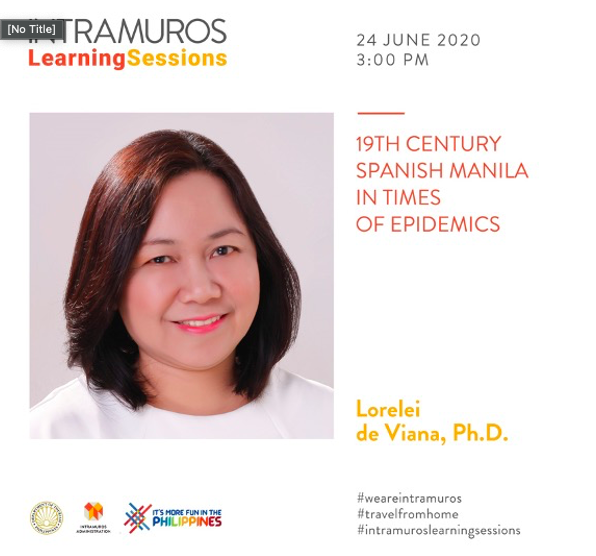Intramuros Learning Sessions episode no. 13

Overview
Epidemics besieged Spanish Manila in the form of cholera and smallpox diseases. In the early part of the 19th century, smallpox vaccination became available in the Philippines. The Junta de Sanidad (Council for Health) and positions for vacunadores were created to jumpstart a public health program to manage the disease. It was not only smallpox but also the deadly cholera that resulted in a significant number of deaths among Manila’s population especially in 1820 and 1882. The 1820 cholera caused the massacre of foreigners in Manila and the untimely opening of a new general cemetery for Manila, the Cementerio General de Dilao, then still under construction. In 1882, another massive cholera outbreak decimated a large part of Manila’s population. The epidemic resulted in the the creation of sanitary and quarantine measures, the closure of Manila’s parish cemeteries and the establishment of a welfare organization for those affected by cholera deaths. This talk will dwell on the challenges that Manila faced during the times of smallpox and cholera epidemics in the 19th century, the state mechanisms effected, and the native response to these measures.
- Guest speaker: Lorelei de Viana, Ph.D.
- Moderator: Rancho Arcilla
About the Speaker: Lorelei de Viana, Ph.D.
Lorelei de Viana, Ph.D. is an Architect, Art Historian, and Academic Lecturer. She worked for the National Historical Institute, now the National Historical Commission of the Philippines, as Historical Researcher and later as Supervising Architect. She was Dean for Architecture and Fine Arts of the Far Eastern University and later a Research Fellow of the FEU Public Policy Center.
She was President of the Manila Studies Association and the Council of Deans and Heads of Architecture Schools in the Philippines. She has authored books and written journal articles on architectural history, heritage and conservation.
About the moderator: Rancho Arcilla
John Paul Escandor Arcilla, known professionally as Rancho Arcilla, is the author of the Intramuros Register of Styles (2021). He served as Chairperson of the Intramuros Technical Committee on Architectural Standards (TCAS) from June 2022 to May 2024. As TCAS Chairperson, Arcilla oversaw the review of all development, including new constructions, in the Walled City.
Arcilla was also the first Archivist of the Intramuros Administration. With a mandate from Atty. Guiller Asido, Administrator of Intramuros from 2017 to 2022, Arcilla established the Administration’s Archives and Central Records Section, serving as its first Section Head from July 2019 to June 2024.
He has an MA in Philippine Studies from UP Diliman and a BA in Asian Studies from the University of Santo Tomas. Arcilla specializes on colonial architecture.
In 2021, Arcilla was instrumental in the development of the Revised 2021 Implementing Rules and Regulations (IRR) of Presidential Decree No. 1616, the main framework and legal instrument in the management of Intramuros District. The architectural provisions of the IRR and the Intramuros Register of Styles (2021) is based on his MA thesis Walls within Walls: The Architecture of Intramuros (2021).
About the Intramuros Learning Sessions
The Intramuros Learning Sessions (ILS) is the educational lecture series of the Intramuros Administration (IA). The IA is an attached national government agency under the Department of Tourism.
Topics are interdisciplinary and cover themes related to Intramuros and Manila studies, Philippine studies, as well as cultural heritage studies. Pursuant to IA’s charter, the ILS aims to contribute to the strengthening of the Filipino’s national identity and sense of belonging and pride.
| See Previous ILS Episode A Visit to Luneta’s Colorful Past, Current State and Future Developments | See Next ILS Episode Indio Response: The Museo de Intramuros Collection |
Check out our previous ILS episodes here
For more information contact the Center for Intramuros Studies via research@intramuros.gov.ph
Cannot find what you are looking for? Try requesting for more data via our eFOI Portal.





